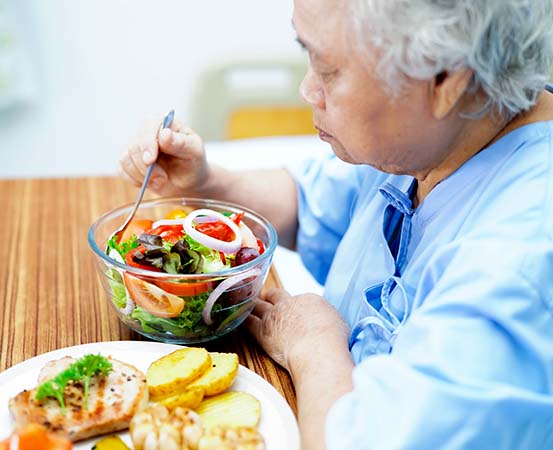
Dialysis and kidney transplant, popular renal replacement therapies that aid in proper kidney function, have been considered the default treatment options for those diagnosed with end-stage kidney disease (ESKD). However, conservative care has emerged as an alternative treatment approach, especially for elderly people, where the side effects of dialysis and transplant may outweigh the benefits.
While the two typical treatment approaches can improve overall health and the quality and quantity of life for many, they may not work for some. “The aim of conservative care is to alleviate symptoms and improve the quality of life of the individual,” says Dr Vidyashankar P, lead consultant, nephrology, Aster CMI Hospital, Bangalore.
Conservative management: A holistic approach
In the past, those who were unwilling or unfit for dialysis received medical care primarily focused on symptom management. Over the years, there has been an emphasis on developing a structured approach that takes the individual’s holistic needs into account. “Conservative care involves a multidisciplinary team of nephrologists, dietitians, psychologists, pain specialists, nurses, physiotherapists and social workers to cater to the various needs of the individual,” says Dr Vidyashankar. The caregivers or family members of the individual also become part of this treatment modality.
Conservative care: Who can opt for it?
Older adults, as well as those with frailty or multiple comorbid conditions, can opt for conservative care, as invasive treatment approaches may not be best suited for them.
Dr Vidyashankar recounts treating an 82-year-old man from Bangalore with ESKD in 2021. The man opted for conservative kidney care over dialysis owing to his old age. “Apart from symptomatic treatment, he was given comprehensive dietary instructions and was advised to exercise and ensure adequate sleep,” says Dr Vidyashankar. “He has been under conservative care for the past two years.”
Dr Nandini Vallath, professor and HOD, department of pain and palliative medicine, St John’s Medical College Hospital, Bangalore, says conservative care is selected as the line of treatment for many geriatric people with ESKD. “People over the age of 75, especially those with comorbidities like cardiovascular conditions, hypertension, dementia and stroke, may not significantly benefit from dialysis; it might even prove detrimental to their health,” she shares.
Furthermore, she adds that frailty, characterized by a decline in physical and cognitive reserves, is also a contraindication. It makes one more vulnerable to sudden fluctuations in their health.
Dialysis can be burdensome
“Approximately 10% of people on dialysis may undergo a transplant, as not everyone is deemed fit for it. This makes dialysis a life-long process for many with ESKD,” says Dr Vallath.
Furthermore, the burden of dialysis can be cumbersome for many, causing side effects like lethargy and weakness. It can also give rise to psychological conditions such as depression and anxiety.
“For dialysis, the individual has to make trips to the dialysis center thrice a week, often accompanied by a caregiver. Besides, it can also take a toll on their finances,” points out Dr Vallath. As a result, some people may choose not to opt for dialysis or decide to discontinue it after a certain point.
Controlling symptoms without dialysis
“Poor appetite is common among people with chronic kidney disease (CKD). A dietitian curates a diet that doesn’t burden the kidneys while providing the taste and nutrition that the individual needs,” says Dr Avinash Ignatius, senior consultant nephrologist and head of the nephrology department at Noble Hospital, Pune. In addition, medications are prescribed to improve appetite and reduce symptoms like nausea.
“Water retention is another common complaint, which is addressed by teaching the individual some methods to limit fluid and salt intake, along with choosing foods that can reduce thirst. Diuretics are given to help the kidneys flush out more water,” informs Dr Ignatius.
He further adds that CKD can elevate phosphorus levels in the body, leading to itching. In such cases, topical creams are used, and a low-phosphorus diet is recommended alongside medications.
How long do people on conservative care survive?
According to Dr Ignatius, the duration of survival varies depending on the individual. It can be influenced by underlying health conditions and may range from a few days to months or even years. A study published in the Clinical Journal of the American Society of Nephrology in 2016 did not find any statistically significant survival advantage among people aged 80 or older who chose renal replacement therapy over conservative management. However, those with comorbidities had a lower survival advantage.
“If someone is critically ill and is in the ICU, the family may opt for conservative care instead of dialysis. In such a scenario, the survival duration may extend for a few days,” says Dr Ignatius.
Takeaways
Conservative care is a viable treatment option for people with end-stage kidney disease who don’t want to undergo invasive treatments (like dialysis or a kidney transplant) or are deemed unfit for them. Besides being expensive, such treatment options can also lead to mental and physical side effects. Therefore, a treatment approach focused on alleviating symptoms through medications, diet and exercise can play an important role in improving the quality of life of individuals.

















One Response
Valuable information. Did not know about other options other than dialysis.